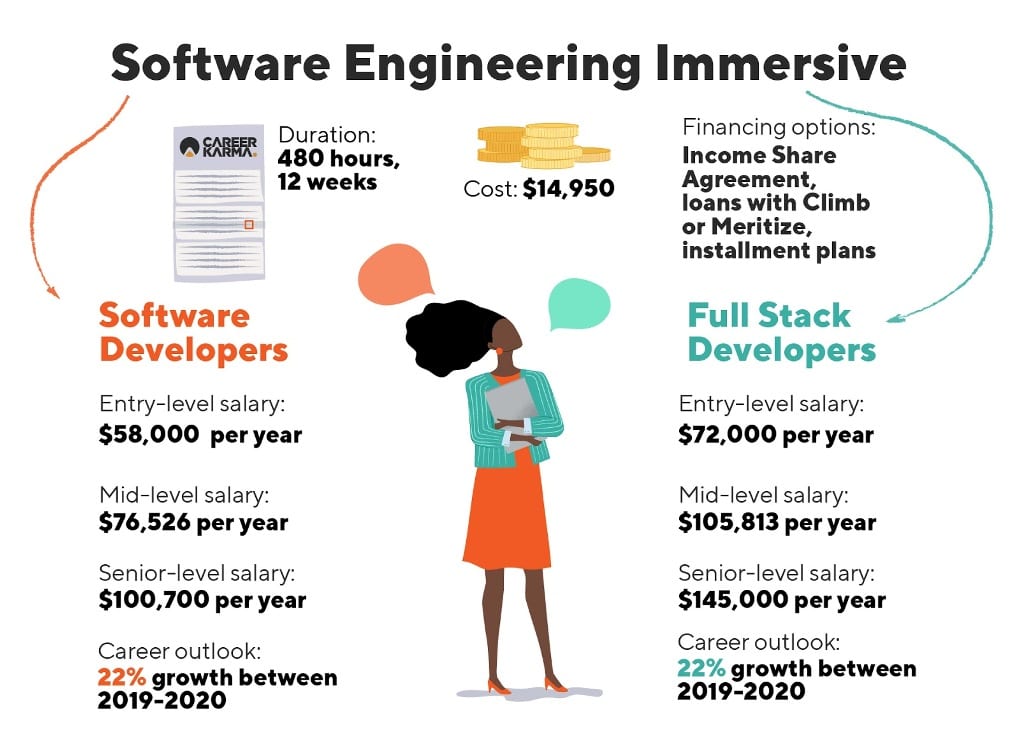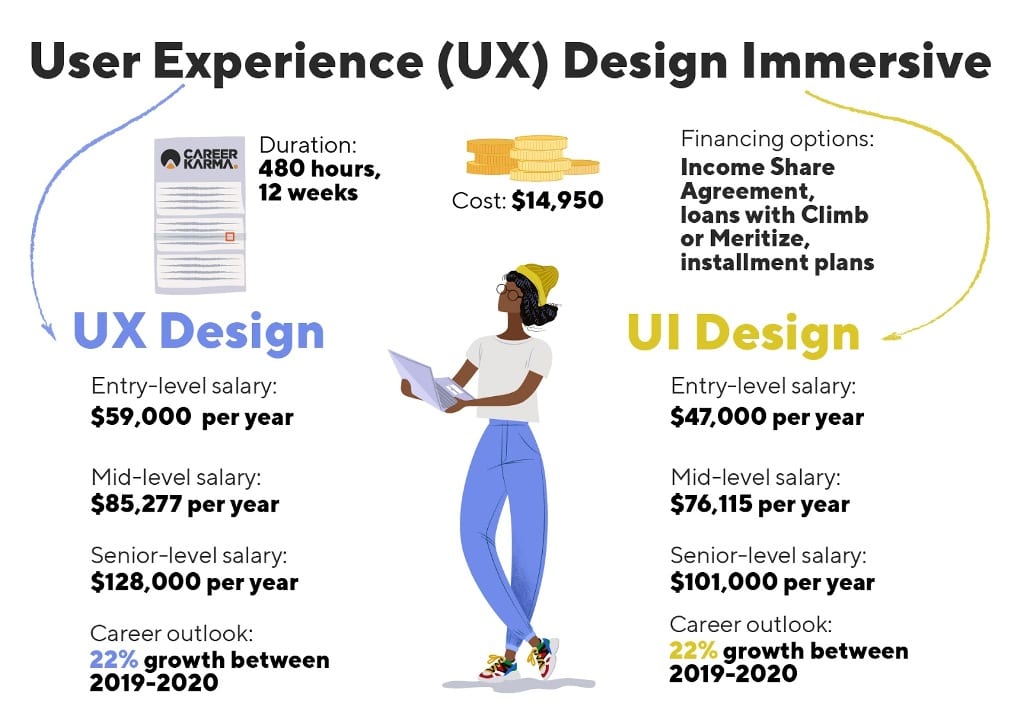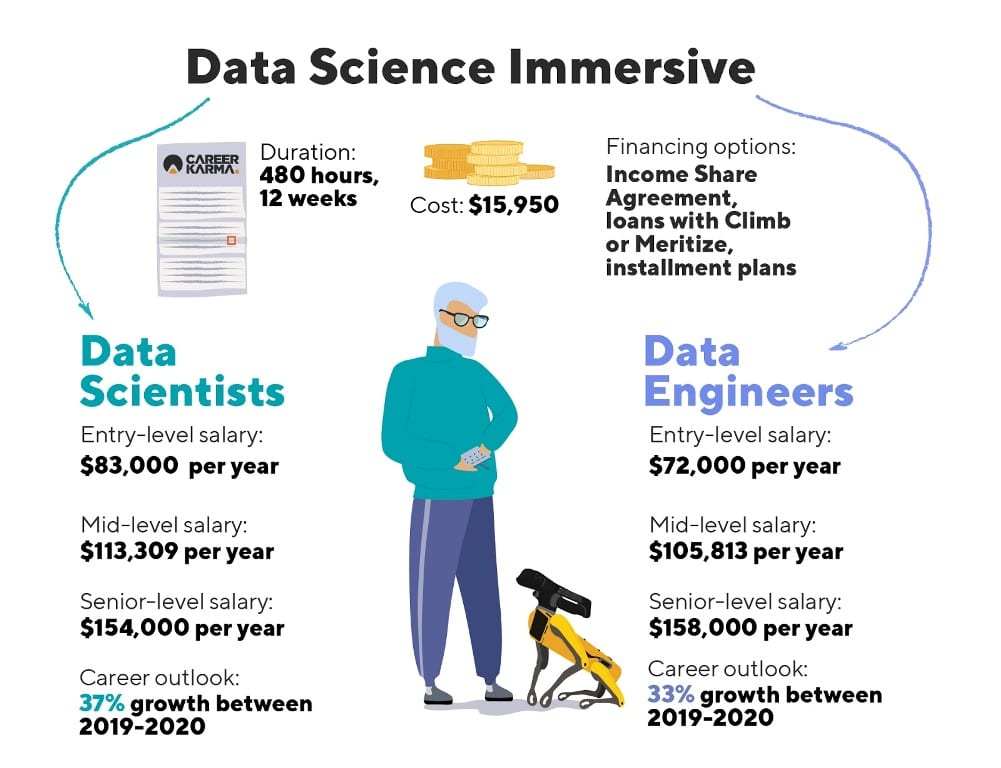Exploring a career in tech is beyond big, fat paychecks. The industry is resilient, as evident in its continuous progression amidst turbulent times, just as we have seen during the recent pandemic threats. Aside from that, it is also where the future’s at. For instance, 12 out of the 15 Jobs of Tomorrow in LinkedIn’s 2020 Emerging Jobs Report are from the tech industry, with positions such as back end developers, data engineers, and JavaScript developers getting the limelight.
In spite of the development of technologies such as Artificial Intelligence and Machine Learning, there is still a place for tech enthusiasts to continue to thrive. In fact, the same report predicted that as automation becomes more widespread, the demand for soft skills—that are unique to humans—is likely to also increase.
“Skills like communication, creativity, and collaboration are all virtually impossible to automate, which means if you have these skills you’ll be even more valuable to organizations in the future,” says the report.
More importantly, the tech industry wants you. In the first quarter of 2019 alone, U.S. employers were in need of nearly one million tech talents to fill various open roles, according to IT trade group CompTIA. Given the big gap, rest assured that there are abundant opportunities that await. Tech professionals are also compensated handsomely with more than monetary rewards.
These are some of the countless reasons why more school-leavers are pursuing tertiary education in tech and a huge number of professionals making the jump into this ever-progressing industry. If you are interested in joining the global tech community, read on further as we uncover more about bootcamp education at a renowned coding bootcamp, General Assembly, and the doors it could open.
Where to Start
Seeing as the industry requires technical abilities, the first step that you can take is to acquire the skills needed to pursue a desired tech role. Ideally, it is advisable that you learn a little bit about all potential career journeys that you can embark on, just so you can match your options to your interests, goals, and existing skill sets. This way, you’ll be able to make a sound financial, time, and energy investment when you decide to join the tech world.
Don’t worry, this process doesn’t have to be as intimidating as it may sound because we are here to help. In this article, we will be panning in on bootcamp education, an alternative to the conventional tertiary education at a fraction of the costs and time.
Why are coding bootcamps growing in popularity, you ask? Not only are they cheaper and faster to complete, but most of the courses offered are also curated and taught by industry professionals. This means that most of the instructors are able to impart technical knowledge and guide students through their very own experience. The hands-on approach is one of the many factors that set bootcamps apart from other education tracks.
On top of that, most bootcamps offer the flexibility that not many traditional universities could, in terms of commitment and financing options. For instance, a majority of bootcamps offer part-time courses and some forms of deferred payment plans which work great for career changers or those who are juggling other responsibilities. This allows students to get a fair chance at learning by allowing them to set the schedule and finances accordingly.
One of the top bootcamps in the market is General Assembly, a school that had its start as a coworking space in 2011 before expanding into one of the largest names today, with 35 in-person campuses across the globe, as well as an online campus. Over 12,000 of its graduates from full-time programs have succeeded in launching new careers over the past seven years. Read on further here for a more extensive review of the school.
Will I Succeed at General Assembly?
The best way to measure a school’s success—and therefore, your chances at making it—is to analyze the outcomes report. General Assembly has recently released its Outcomes Report 2018-2019, which was reviewed by a Big Four accounting firm, KPMG. The report looked at the graduation and job placement rates for 4,287 students completing General Assembly’s programs over 18 months, between January 1, 2018, and March 31, 2019.
Based on the report, 91.4% of graduates who participated in the school’s full-time Career Services program accepted a job offer in their field of study within 180 days of graduating. Meanwhile, an additional 8.3% of graduates accepted a job offer after 180 days, for a total of 99.7% of this eligible population working in their fields.
However, it is important to note that while the figures are accurate, it is a reflection of the job market prior to COVID-19. While students today can find similar success, their path into tech could take longer.
Nonetheless, these are impressive figures that further strengthen the credibility of the curriculum and the career services offered by General Assembly. The figures also correspond well to the fact that the tech market is in need of top-tier talent. It should also be noted that General Assembly’s graduates have managed to land positions at multi-industry companies including Amazon, Charles Schwab, Dell, Google, Home Depot, IBM, and more.
Head of Talent Acquisition at InvestCloud, Alyse Jacobsen: “GA grads are quick learners, efficient problem-solvers, and dedicated web developers. They have proven to be valuable additions to our team!”
Given the school’s track record, the chances of you successfully breaking into tech is high, as long as you’re willing to put in the hard work and invest your time in learning the skills you desire.
Career Paths
Now that we got a glimpse into bootcamp education, General Assembly, and its record of performance, it is time to take a closer look at the courses that you can take and the ensuing career tracks. This should serve as a guide to help you better understand where you are putting your investments toward.
It should be noted that while the roles suggested below are definitely accurate and a real possibility, the outcomes may differ according to individual experiences and available opportunities. Some of the jobs listed in this article may not be accessible immediately at entry-level and may require a certain level of industry expertise.
We will be covering three major full-time courses that are available on-campus and online, before looking at the overview of the part-time courses. At the time of writing, all courses are only available online due to restrictions and safety measures involving the ongoing pandemic.
Software Engineering Immersive

Costs: $14,950
Duration: 480 hours, 12 weeks
Financing options: Income Share Agreement loan, private loans with Climb or Meritize, installment plans
This is the perfect course for all software engineering enthusiasts. In this 12-week program, students will learn the core skills to build full stack web applications such as computer science fundamentals, collaboration tools, and programming languages that are highly in-demand.
General Assembly’s award-winning curriculum was developed with guidance from its software engineering board, comprised of leading industry professionals with years of experience. This will equip students with the skills that are sought-after by top employers of the day.
On top of that, the program was formulated to be well-rounded, honing students’ proficiency in multiple frameworks and stacks. By the end of the course, students should be able to apply essential object-oriented programming concepts and leverage JavaScript libraries like React, among others. Students will also be taught to effectively communicate and collaborate with web development teams to carry out projects from concept to completion.
A Flex version of the Software Engineering course is also available on a 24-week, part-time schedule.
Some of the career options you can explore with this mastery:
Software Developers
Entry-level salary: $58,000 per year
Mid-level salary: $76,526 per year
Senior-level salary: $100,700 per year
Career outlook: 22% growth between 2019-2020
Software developers are professionals in charge of writing code as a part of developing an application or software. Beyond that, they are required to test the code and make the necessary changes to ensure the application or software functions well. The position requires knowledge of development methodologies, programming languages like Java, version control systems like GitHub, and the ability to write test-driven code.
If you enjoy a collaborative process, this job suits you best because software developers—especially when working on larger projects—join forces with their peers in a team. As reported by the U.S. Bureau of Labor Statistics (BLS), it is a lucrative career with projected steady growth. “Software developers will be needed to respond to an increased demand for computer software,” it said.
The role has been cited by many reports, including CIO ASEAN’s 10 Most In-Demand Tech Jobs for 2020, as one with a positive outlook, with entry-level positions raking in an average of $99,250 annually. Meanwhile, mid-level and senior-level developers can expect to bring home $120,750 and $206,500 respectively.
Full Stack Developers
Entry-level salary: $72,000 per year
Mid-level salary: $105,813 per year
Senior-level salary: $145,000 per year
Career outlook: 22% growth between 2019-2020
This is a unique career path that combines two tech proficiencies; the front end and the back end. Full stack developers can develop a website or an app on the server-side as well as work on the interactive elements. As such, they require extensive knowledge of both these areas of web or app development.
Full stack developers are highly sought-after by many employers as they can single-handedly take on the tasks that would otherwise require two separate professionals. From the perspective of employers, recruiting one full stack developer is a financially-sound and effective call. Their versatility and expertise perfectly match up with the needs of the current job market, making them a viable candidate in the tech world.
Other roles to consider: Back End Developers, Front End Engineers, and DevOps Engineers.
User Experience (UX) Design Immersive

Costs: $14,950
Duration: 480 hours, 12 weeks
Financing options: Income Share Agreement loans, private loans with Climb or Meritize, installment plans
General Assembly boasts a well-rounded UX bootcamp curriculum that is approved by industry experts. In this course, students get a first-hand chance of utilizing essential tactics like wireframing, prototyping, user research, and usability testing. Aside from diving deep into visual and user interface design, discussions will include hot topics like service design and design leadership.
Throughout the course duration, there are six units to cover: UX Foundations, UI Foundations, Design Iteration and Development, Working With a Product Team, UX in the Real World, and UX Career Planning. The best part is students get to collaborate with leading professionals through lectures, research exercises, and real-world client projects.
This course is taught by UX design veterans who are committed to giving personalized feedback and support to help students gain confidence with key concepts and tools. If you are interested in learning more about the instructors at General Assembly, head on to our Instructors’ Spotlight article where we get up close and personal with four colorful personalities who have helped thousands of students get one step closer to their dream careers.
Some of the career options available to UX Design graduates are:
UX Designers
Entry-level salary: $59,000 per year
Mid-level salary: $85,277 per year
Senior-level salary: $128,000 per year
Career outlook: 22% growth between 2019-2020
It is without a doubt that design plays an important role in influencing customers’ behaviors. As consumers, we respond better to products and services that are well put-together, in terms of both functionality and aesthetics. That is where UX design comes in.
In essence, UX designers are in charge of curating and predicting how users would react when using a specific product or service. They achieve this by employing programming skills, visual design, usability testing, and psychology. Not only are UX designers required to find out what would give off the best user experience, but in most cases, they also need to be able to execute the plans in place—this is where the coding skills come in handy.
More and more companies are allocating a bulk of their resources on acquiring top-notch design talents because circumstances have proved that design is indeed a vital part of marketing. According to a Dice article citing analytics platform Burning Glass: “The average time required for filling a UI or UX position is 41 days—pretty high, and indicative of strong demand.”
UI Designers
Entry-level salary: $47,000 per year
Mid-level salary: $76,115 per year
Senior-level salary: $101,000 per year
Career outlook: 22% growth between 2019-2020
UI design is a corresponding area of UX design. The major difference is that while the latter takes into account the overall experience when using a product or service, UI design or User Interface focuses solely on the interface—a part of the product that users can experience and interact with.
As a UI designer, you will have to employ your design skills to realize the vision that was proposed by a UX designer. Ultimately, the aim is to create interfaces that not only align with the goals set by the company but also fulfill the expectations of the user. This includes aligning the visual elements and interactive properties in a way that is easy to navigate. In cases where the product has other forms of interfaces, such as voice-controlled interface, a UI designer is also expected to perform similar tasks.
Other roles to consider: Web Designers, Game Developers, and SEO Specialists.
Data Science Immersive

Costs: $15,950
Duration: 480 hours, 12 weeks
Financing options: Income Share Agreement loan, private loans with Climb or Meritize, installment plans
The field of data science is growing exponentially and it is expected to only get bigger. In fact, data science has once again topped LinkedIn’s Emerging Jobs Report 2020 for three consecutive years.
With this in mind, General Assembly has sought the advice of its Data Science Standards Board—a group of data executives from companies like Bloomberg and Nielsen—to formulate a curriculum like no other.
Students can expect to familiarize themselves with Python, data analysis, and statistical modeling before branching into machine learning with algorithms of increasing complexity. The capstone project will see students producing machine learning models that address a real-world data challenge.
Aside from lectures, students are also tasked to tackle five projects which will help them compile a professional-grade portfolio by the time they complete the course.
Here are some career options that might interest you:
Data Scientists
Entry-level salary: $83,000 per year
Mid-level salary: $113,309 per year
Senior-level salary: $154,000 per year
Career outlook: 37% annual growth
As the tech industry continues to spur innovation, roles pertaining to data science are becoming increasingly sought-after. According to LinkedIn, data scientists have topped its Emerging Jobs list for three years running, with continuously positive hiring growth.
“Our data indicates some of this growth can likely be attributed to the evolution of previously existing jobs, like Statisticians, and increased emphasis on data in academic research,” it said.
Data scientists are not unlike data analysts, they work to decipher massive volumes of data to draw practical insights for businesses. Unlike data analysts, data scientists work to develop custom algorithms rather than simply using existing software to draw deeper and more involved information from the data.
One of the most interesting parts of this role is there are a variety of job scopes involved, which means your days will be far from mundane. From wrangling large sets of data to analyzing them, it’s all in a day’s job for data scientists. This role will allow you to flex your technical skills like Python and Apache Spark while gaining a better understanding of Big Data and its roles in today’s world.
Data Engineers
Entry-level salary: $72,000 per year
Mid-level salary: $102,864 per year
Senior-level salary: $158,000 per year
Career outlook: 33% annual growth
Data engineers are mainly in charge of creating and maintaining analytics infrastructure involving data. While the job may not be as popular among those outside of the tech circle, data engineers hold a vital role in ensuring corresponding peers like data scientists and data analysts are able to perform their designated tasks. They are professionals with niche skill sets and extensive knowledge of SQL, Apache Sparks, and Python, among others. Data engineers are responsible for creating many of the existing standards and software used in data fields.
According to IBM’s The Quant Crunch report, the demand for both data scientists and data engineers is projected to grow 39%, although it did not specify the exact timeframe of this projection.
LinkedIn said: “The hiring growth rate of professionals in this emerging job has increased by nearly 35% since 2015, and industries from Retail to Automotive are snapping up this hard-to-hire talent.”
The role also made it to the list of CIO Asean’s 10 Most In-Demand Tech Jobs for 2020, citing salaries as high as $130,000 annually for entry-level positions.
Other roles to consider: Cloud Engineers, Machine Learning Specialists, and Data Analysts.
Part-Time Courses
General Assembly came to inception with a mission to “close the skills gap” and the school strives to provide support to all tech enthusiasts, even if they can’t commit to a full-time program. These part-time programs are perfect for those who need a slight pivot from their current career, school leavers who are mulling over a few career tracks, and professionals who are juggling other commitments.
There are 11 part-time courses available, covering fields such as Python Programming, Data Analytics, Digital Marketing, Product Management, Visual Design, Data Science, and React Development. Depending on the subject, the part-time courses require between 32 to 60 hours to complete within 8 to 10 weeks, with the help of an instructor. However, it should be noted that the part-time programs do not come with the benefit of career services.
If you prefer self-paced learning, there are also four courses from the On-Demand Learning initiative that you can check out. These courses are done fully online but fret not, as the school provides 1:1 mentor support. For more information about the courses, visit General Assembly’s Course Catalog.
How To Change Careers
Making that jump can be a scary decision, but it doesn’t have to be. Even if you don’t have any tech background, you can still make a successful transition into this thriving industry if you are committed to learning new skills.
Career Karma spoke to Kay Chan, a 49-year-old New Yorker, who bagged a job as a junior software engineer at Forbes in less than three months after graduating from General Assembly. The computer science major, who left her full-time job to focus on being a mother, revealed that even with her background, the key to jumpstart your career is being dedicated to your new goals.
“I did computer science work for a financial firm but then I stopped for about 10 years to focus on my daughter. Once she got older, I wanted to go back to the job market but the questions I got asked during interviews made me realize that there are a lot of new things that I’m not familiar with.
“Then I did my research, contemplating between bootcamps and colleges. A lot of people recommended General Assembly and considering the costs, I really had to think twice—it’s not a small amount of money. I didn’t know if this was going to work or if I’d ever get to go back to the current job market. Can a three-month bootcamp really help me?
“However, once I found out about the curriculum, I was sold. A lot of colleges don’t teach what the job would want you to know, it’s a lot more concept-oriented and not hands-on. GA provides a curriculum that the industry is looking for. On top of that, the school offers an Income Share Agreement option so I figured I had nothing to lose.”
She signed up for the Software Engineering Immersive program in February this year and completed her course by the end of May. In August, she landed a job at Forbes and is now enjoying her new work environment.
Mrs. Chan hoped that her story would empower others, especially career changers and women who are in the same position.
“Don’t be scared. About 90% of my classmates had no computer science background. Going into it, you should know that bootcamps can’t guarantee you a job—no one can. But if you set your heart to it, put in the work, it will be worth it. Just don’t give up.
“The pandemic sort of forced the digital world to expand quicker and almost everything takes place online now, so there are a lot of opportunities especially for software engineers. I hope my story will motivate those who feel like they are stuck in a rut or those who feel like they don’t stand a chance anymore just because they put their career on hold for their family.”
While the job search journey and outcome looks different for each student based on their previous professional and education background, as well as their personal career goals, General Assembly is dedicated to the success and support of all graduates who are willing to put in the time and effort in their search. Read more about this in the Career Support section.
Career Support
Another factor that can boost your career transition is by getting help from professionals who understand how the recruitment process works. At General Assembly, students who opted for full-time programs have access to a career coach.
Through one on ones coaches work with individual students in planning and achieving their job search goals. During these sessions, students have the chance to sharpen and master their interview skills, learn how to showcase their projects, and build their own personal brand—all key elements needed to land your dream job.
The school also boasts a large partner network so students can take advantage of the access to exclusive networking opportunities where they can connect with hiring managers. The extensive career support will ensure that you not only master the technical knowledge, but also the soft skills needed to ace your next interview. Find out more here.
Conclusion
The tech industry is a welcoming environment—it has a place for everyone, regardless of background. Take that first step toward a new, rewarding career with General Assembly today. If you’re unsure about where to start, check out General Assembly reviews. Likewise, General Assembly’s Admissions team is more than happy to assist. Call +1 (213) 263-4147 or click here to fill in your details and get customized feedback.
About us: Career Karma is a platform designed to help job seekers find, research, and connect with job training programs to advance their careers. Learn about the CK publication.

